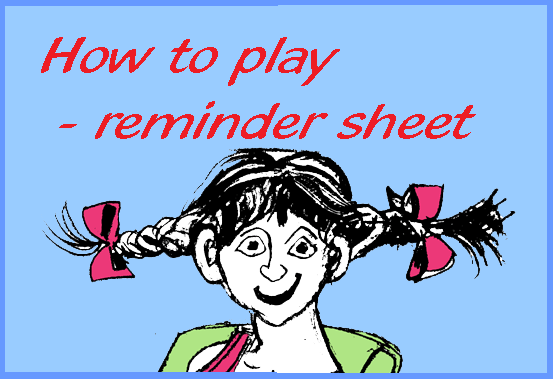
Spades is played with a standard pack of cards: remember them? Spades isn’t widely played in the UK so it’s not well known, even to keen card players. But it’s very popular in the USA, and people from right across the world play at BoardGameArena.
How to play.
Four players are in partnerships, sitting across from each other.
Being a trick taking game (like whist), ranked and suited cards are used to win tricks. Aces are the highest ranking card in any suit. Players must always follow the suit that was led if they are able to.
There are trumps, and the trump suit is always spades.
So, with 13 cards being dealt, each hand is 13 tricks long. Once all 13 tricks have been played and won, that hand is scored, and dealing passes leftwards for the next hand of 13 tricks.
The bidding before play begins.
The dealer having dealt out 13 cards to everyone, player on dealer’s left indicates how many of the 13 tricks they think they will win: just them, not their partnership. Bidding thus passes around the table. Every player must indicate how many they think they’ll each win: without conferring. Each bids once only (unlike bridge, where bidding may go on for ages, or solo, in which bidders may get a second chance).
To repeat, everyone must make a bid, which may range up to 13 (that’s extremely rare).
But rather than the minimum bid being 1, it’s zero ~ more of that later.
The play – how does it proceed?
Player left of dealer always starts. They can open play by laying any card except a spade. Spades may not be led by anybody until after they have been used for the first time as a trump: that is, played after a lead of another suit (until spades have ‘broken’ that is). Unless the player only has has spades in their hand.
As mentioned, players must follow suit if they have cards in the suit that’s led. The highest card that’s played wins the trick, and the cards are collected up by the person that won it – not by their partner. The cards are set aside so that the winner’s won-tricks can be clearly seen and counted by everybody. After all, this is a trick taking game, and everybody must be able to see exactly what’s going on as the hand proceeds.
If someone cannot follow suit, they may choose either to play spades, as a trump, or to discard a card of another suit. If they do ‘trump in’, and their spade is the highest card played (beating any other spades played), they win the trick.
Players need access to a pot of beans or counters so that they can display to all and sundry what they have bid. Further, each time a player wins a trick and places it face down in front of themselves, they should place one of their beans atop so that all (themselves included) can see how many they bid, and how many they have won so far.
Now, it’s important to know how the scoring goes, because that will determine how many tricks you do (or do not) want to win.
So, how does the scoring go?
One person acts as scorekeeper.
Games are generally played to 500 points … but to however many you want.
Let’s look at a zero bid first.
Bidding a zero and getting it can boost the partnership’s points substantially. (“Getting” zero sounds a bit weird, doesn’t it.)
But the costs of failing (by winning any tricks) can be deeply saddening.
- If a person bids and gets zero, the partnership gains 100 bonus.
- If a zero-bidder wins a single trick, they have failed (they have ‘gone down’), and there’s a penalty of 100 points against the partnership.
- The pair also gets one bag 👜 for every trick that the zero bidder wins (more about bags later).
- The tricks won by the zero-bidder do not contribute to their partner’s gained tricks.
- If the zero-bidder’s partner gets their bid, they get 10 points for each bid trick, and 1 for each extra trick.
They also get a sandbag for each extra trick that they win over their bid. - The partner of the zero bidder needs to consider how far they’ll go in order to ensure that the zero does not fail: how extensively and cleverly will they give cover.
Sacrifices may be called for … 😮 … partner must weigh up the costs and benefits of allowing the zero to fail.
Now for above-zero bids – how do they score?
- When a player says how many tricks they individually expect to win, they put that number of beans or counters in front of themselves so that everybody can always see exactly how they are doing in terms of getting, or not getting the tricks they bid for.
- If neither player bids zero, their individual bids and tricks are combined into a ‘partnership’ bid. But the beans stay where they are, in front of the individual bidders.
So, if one bid 3 and the other bid 2, they are jointly seeking 5 tricks. It doesn’t matter whether each gets what they bid. It’s their joint bid that matters: that’s the number of tricks they jointly are aiming for.
If they make their joint bid, they get 10 points for each trick bid.
So if they bid 5 and won 5, they’d score 50. - If they win more than 5, then for each extra trick they get a single point, and they’ll get one sandbag (‘bags’). If they bid 5 and won 7 tricks, they’d score 50+2 points and 2 sandbags.
- If a pair are jointly short of their combined bid (or if the partner of a zero-bidder is short of theirs), they lose 10 points times the number of tricks that they bid.
So if a pair bid 3 and 2 (5), and only get 4, they lose 50 points (10 times 5).
If the partner of a zero bidder said they’d get 7, but only gets 6, the partnership loses 70 points – no matter whether the zero bidder gets their zero or not.
It doesn’t matter by how many they fail. The penalty is 10 times the bid: nothing to do with the size of the failure.
Sandbags

Winning extra tricks may at times be ‘a good thing’, because by doing so you may make opponents fail to achieve their joint bid. But the gathering of sandbags needs to be approached with caution.
Not nice: being hit around the head with a sandbag !
- The number of sandbags accumulated is as important as points scored, and must not be overlooked.
- Partnership’s points scores are dealt with first – then sandbags.
- When a partnership reaches 10 sandbags, their score is reduced by 100 points. That’s it ~ simple, quite painful. Sandbags can hurt.
- The 10 sandbags are knocked off their accumulated number of bags, but any above 10 are left: counting towards their next ten!
So …. spades is …
- highly replayable
- skill & strategy are learned
- very combative – trick taking
- luck of the deal is involved of course
- has plenty of appeal for experienced card players
- plays well online

